Rye Barcott's Blog, page 5
September 23, 2020
Sacrificing for Success: A Tribute to Tabitha Festo
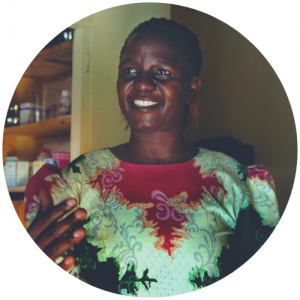
With $26, a personal sacrifice, and a fierce commitment to serving her community, Tabitha Atieno Festo laid the foundation for Carolina for Kibera (CFK) in 2000.
A widowed nurse and mother of four, Tabitha struggled to find work in Kibera after her employer decided to downsize in 1998. Desperate to continue supporting her family, Tabitha moved into an abandoned vegetable stand in Toi Market. Two years later, Tabitha met Rye Barcott, then a student at the University of North Carolina at Chapel Hill, who was researching youth empowerment and ethnic violence in Kibera. Though Rye had made a point to not distribute money while in Kibera, partly because he did not want to create a cycle of dependency and partly because of safety advice he had received from locals, Tabitha approached him with conviction and a plan. She asked him for an investment of 2,000 Kenya shillings, about $26 U.S. dollars, and told him that she planned to use the money to buy vegetables and sell them in the Eastleigh District of Nairobi to make a small profit. Tabitha’s pointedness and confidence struck Rye; he gave her the $26 investment she asked for and flew back to the United States the next day.
After selling vegetables, Tabitha accumulated money and joined a local women’s micro-finance group. Six months later, she had $130 in savings and used the money to achieve her lifelong dream of opening a clinic. One of the few clinics in Kibera operated by a registered nurse, Tabitha’s facility was attached to her home and operated 24 hours per day because, in her words, “people do not stop getting sick at night.”
Nurse-to-Nurse: Sustaining Tabitha Medical Clinic
Though Tabitha worked hard to establish Tabitha Medical Clinic, she dreamed of providing high-quality maternal care and would not rest until the clinic became self-sustaining. To do that, she needed support. She needed microscopes to differentiate between infectious diseases such as malaria, yellow fever, and cholera, essential medicines to treat patients with severe illnesses, and recognition from national bodies to operate with authority.
Donna Schwartz-Barcott, an American nurse and anthropologist, helped Tabitha with each of these steps during a tireless two–week visit in 2002. Donna’s son, CFK co-founder Rye Barcott, arranged a room inside Tabitha Medical Clinic for her to stay, and she arrived in Nairobi with three suitcases full of equipment, including a microscope, for the facility.
She first met Tabitha on the way to the clinic and remembered Tabitha taking one of the suitcases and steadying it on her head as she navigated the steep, narrow paths.
“When we arrived at the clinic, Tabitha greeted me warmly with a hug, and we instantly made a connection mother-to-mother,” Donna said.
After setting up the equipment and bonding over their families and the practice of nursing, Donna and Tabitha began attending meetings together, drawing on one another for encouragement and support. First, they visited the Nurses Association for Kenya in Nairobi to ensure that Tabitha and the clinic had proper certification and the authority to operate. Though a bit anxious at first, Tabitha told her story and gained acceptance from the organization. Next, the two women met with a contact of Rye’s at the Ford Foundation and connected with her instantly. Tabitha talked about her adopted son Ronnie and shared her dream of helping women become healthy and financially stable to support their children. The meeting lasted over two hours, and the Ford Foundation became one of CFK’s first major supporters.
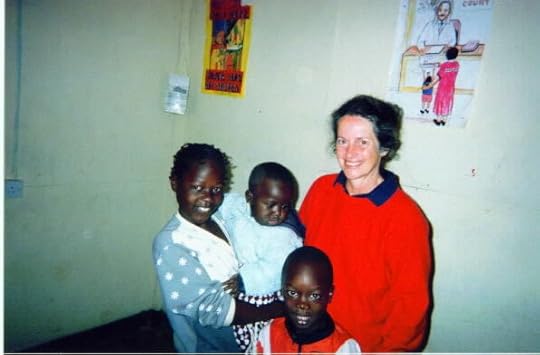 Donna with three of Tabitha's children during her visit to Kibera.
Donna with three of Tabitha's children during her visit to Kibera.Tabitha and Donna also attended CFK’s first board meeting in Kenya, and Rye asked them to present about Tabitha Medical Clinic. At first, Tabitha was hesitant to speak in front of the crowd, but Donna encouraged her to share her story just as she had with the Nurses Association and the Ford Foundation.
“She understood the struggles that women were facing in Kibera, and she would often leave her home in the middle of the night to support women as they gave birth,” Donna said. “Her presentation was powerful and showed the board members that they were dealing with an intelligent professional who knew exactly what her needs were.”
While Donna witnessed Tabitha’s confidence throughout the different meetings, she also appreciated how compassionately she treated patients and noted how well-respected she was in the Kibera community.
“It was common for Tabitha to stop and help someone clearly battling health issues on the street,” Donna said. “An average woman in Kibera couldn’t approach a stranger and do that, but the community seemed to agree that Tabitha could.”
Before Donna left Kibera, she and Tabitha discussed how to make the clinic self-sustaining. Tabitha had already developed a sliding scale payment model, only charging people what they could afford, but that was not enough to cover the cost of essential medicines. The two women talked about expanding the clinic’s services, and Tabitha dreamed of providing high-quality maternal care to women in the community.
By 2004, under Tabitha’s guidance and management, the clinic moved to a permanent location and expanded to include a laboratory and home-based care program for people living with HIV/AIDS. Specializing in maternal health, the clinic also became one of the few in Kibera to offer in-patient and out-patient primary care services to patients 24 hours of the day, seven days a week.
Care Beyond Clinic Walls: A “Mother and a Half”
While Tabitha did achieve her dream of opening her own healthcare facility to serve the Kibera community, her patience and care as a nurse radiated beyond clinic walls. She often provided home-based care and advice for Kiberan residents. Once, she helped her close friend, Jane, deliver her child at home since she “did not have even one shilling” to help pay for a hospital delivery.
Fondly referred to as Mama Jane by many in the community, Jane met Tabitha while they were distant neighbors and both unemployed. The two would spend the days walking through Kibera looking for work and stay up late discussing issues in the community. Jane saw Tabitha as a mother figure, someone who supported her throughout her pregnancy, provided advice on raising a family, and offered emotional and financial support after Jane lost her first daughter in 2002.
“Tabitha was a mother and a half, and I don’t know how to appreciate her enough,” Jane said.
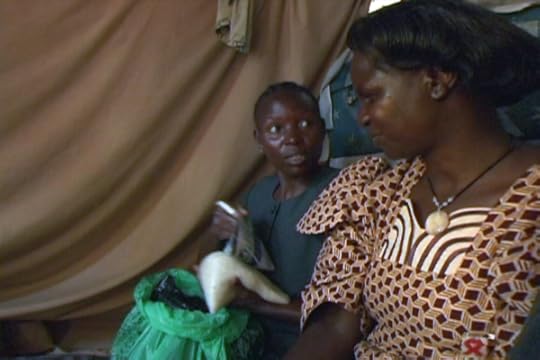 Jane speaking with Tabitha.
Jane speaking with Tabitha.While Jane viewed Tabitha as family, the two also shared a close bond as neighbors and co-workers. Together, they led much of the clinic’s operations in its early days. Though she had no formal training as a nurse, Jane began learning under Tabitha as they worked together.
“If she were alive today, I know that I would be a nurse,” Jane said, recalling how Tabitha constantly guided her and encouraged her to learn more.
Though Tabitha passed away at an early age in 2004, Jane continues to work at Tabitha Medical Clinic and tries to include pieces of Tabitha in her everyday interactions with the people around her.
“Tabitha has helped make me somebody,” Jane said. “She taught me to do what I know to do with all the strength I have. She taught me to be patient, polite, and transparent, and she taught me to listen and make every patient confident.”
Serving the Community: The “Queen of Kibera”
Though Tabitha operated the clinic and saw it grow to serve thousands of patients every year, her dream was to live to see CFK expand its home-based care program and reach more women and children in the streets. Sadly, Tabitha’s health began declining in the early 2000s. Claire Weston, a volunteer with CFK from 2004 to 2005, developed an intimate relationship with Tabitha and her four children during that difficult time, transitioning from writing grants for CFK to assuming the role of one of Tabitha’s caretakers.
The first time they met, Tabitha asked Claire to accompany her to a doctor’s appointment, giving Claire no time to believe that they were strangers. When they arrived at the clinic, Claire hesitated by the door, but Tabitha beckoned her back to the exam room, an area normally reserved for private, intimate interactions between doctors and patients.
“I remember thinking that I had never even accompanied a close friend or family member to an exam room,” Claire said. “But there was no privacy there, and that established a great deal of trust.”
After the appointment, Claire helped Tabitha zip her skirt and bent down to tie her sandals. She had heard a great deal about Tabitha’s leadership and impact on so many lives in Kibera and felt honored to experience these personal moments, supporting Tabitha and her health.
“I thought of Tabitha as the Queen of Kibera,” Claire said. “And the community felt that way too. She was like a celebrity in Kibera, but people also welcomed her into their homes like a trusted friend.”
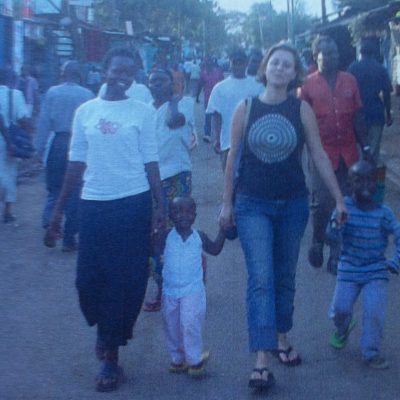 Claire Weston with two of Tabitha's children, Valerie (left) and Ronnie (right), and Tabitha's granddaughter (center).
Claire Weston with two of Tabitha's children, Valerie (left) and Ronnie (right), and Tabitha's granddaughter (center).While Tabitha was sick during most of Claire’s time in Kibera, she continued to hold herself with poise and serve the community with purpose. Claire remembered visiting a postpartum ward with Tabitha during her stay. Most of the women there were struggling with health complications after childbirth; many were dying. Amid the agony, Tabitha approached each patient with a calmness and comfort that encouraged them to keep fighting.
“Like a pine bent and shaped by the wind, she is strong and serene,” Claire recalled writing about Tabitha. “She taught all of us around her how to lead with grace and with selflessness, even amidst great personal difficulties.”
When Tabitha’s health severely declined in late 2004, Claire spent most of her time with Tabitha’s children, Valerie, Kevin, Joy, and Ronnie, by her bedside. Sharing vulnerable moments and raw emotions created quick but deep-rooted bonds among the group.
After Tabitha passed away in December 2004, Claire continued to keep in touch with and provide support for her children. She helped finance Joy’s education, and Joy now works at the same clinic that her mother started nearly 20 years ago.
Learn more about Joy and give a gift of $26 in honor of Tabitha.
Stories of Progress
 Sacrificing for Success: A Tribute to Tabitha FestoTabitha's Story With $26, a personal sacrifice, and a fierce commitment to serving her community, Tabitha Atieno Festo laid the foundation...by Hannah Bain
Sacrificing for Success: A Tribute to Tabitha FestoTabitha's Story With $26, a personal sacrifice, and a fierce commitment to serving her community, Tabitha Atieno Festo laid the foundation...by Hannah Bain
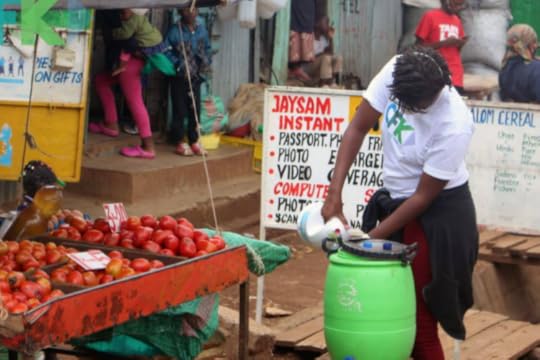 Staff Highlight: Championing Affordable Access to Quality HealthcareThe Story of Joy Bernice Henry As the daughter of CFK’s co-founder, Tabitha Festo, Joy Bernice Henry feels like she is “trying to...by Hannah Bain
Staff Highlight: Championing Affordable Access to Quality HealthcareThe Story of Joy Bernice Henry As the daughter of CFK’s co-founder, Tabitha Festo, Joy Bernice Henry feels like she is “trying to...by Hannah Bain
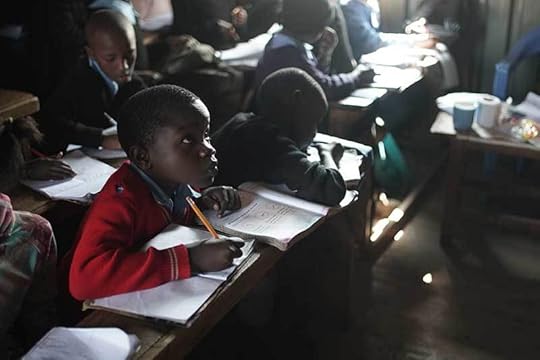 Staff Highlight: Expanding Access to Education in Kibera and BeyondThe Story of Joshua Omweno There is no limit to the impact that education can have on a life, and...by Hannah BainRead more stories
Staff Highlight: Expanding Access to Education in Kibera and BeyondThe Story of Joshua Omweno There is no limit to the impact that education can have on a life, and...by Hannah BainRead more storiesThe post Sacrificing for Success: A Tribute to Tabitha Festo appeared first on Carolina for Kibera.
September 14, 2020
Championing Affordable Access to Quality Healthcare
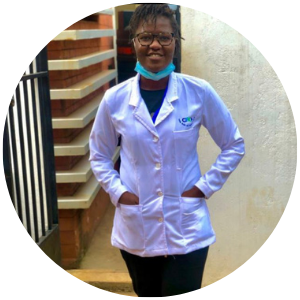
As the daughter of CFK’s co-founder, Tabitha Festo, Joy Barnice Henry feels like she is “trying to fit into shoes that are too big” for her. While Joy takes pride in upholding her mother’s legacy, she is also creating her own path and impacting the lives of many in Kibera and beyond. Growing up in Kibera, Joy experienced firsthand the health challenges stifling the community, and she was inspired to take action.
“The environment is hard. People lack access to clean water and sanitation, and you have to walk quite some distance to get to the toilets, which is paid for in some areas” Joy said.
With a soft heart and strong will, Joy decided to pursue a career in healthcare, a field that would allow her to have a direct impact on her community. She chose to study health systems management and, though her studies were difficult, she persevered and graduated with high marks.
Creating a Unique Path for Impact
After graduation, she returned to Kibera and volunteered with CFK for six months. In 2018, she received an offer for a full-time position as the Tabitha Medical Clinic Administrative Assistant, working for the same clinic that her mother started out of their 10 x 10-foot home with $26 in 2001.
Just a child when her mother established Rye Medical Clinic, renamed Tabitha Medical Clinic after Tabitha’s passing in 2004, Joy has watched the facility grow into what it is today and is proud to be a part of the team. As Tabitha Clinic’s Administrative Assistant, Joy ensures daily administrative and operations roles. She also orders critical medical and non-medical supplies for the clinic and coordinates delivery logistics, which is a large challenge due to the difficult terrain throughout Kibera. The COVID-19 pandemic has created additional challenges as many medical items are out of stock or facing delays in delivery, but Joy has adapted and worked hard to ensure that the clinic has the tools it needs to continue providing essential services to the community every day.
Over the past 19 years, Tabitha Clinic has transformed healthcare in the Kibera community. It was one of the only clinics that remained open during the post-election violence in 2007, and it is one of the only medical facilities providing consistent, high quality services during the current COVID-19 pandemic.
“Tabitha Clinic is a one-stop-shop where you can get all of the services you need,” Joy said. “Most clinics in Kibera do not offer all of that. The fact that Kibera residents have a chance to find quality and affordable healthcare makes me happy every day.”
Honoring Our Past & Pursuing Our Future
Though a fixture in the community for nearly two decades, Kiberans commonly referred to Tabitha Clinic as the CDC Clinic due to the facility’s partnership with the Centers for Disease Control and Prevention (CDC). This misnomer failed to honor the clinic’s local roots and it deterred Kiberans from visiting the facility.
Clinic staff, including Joy, agreed that a re-brand was necessary, and Joy led the initiative by ensuring that all patient-facing materials included the CFK logo and the name Tabitha Clinic. Everything from lab coats and receipt books to appointment slips carried the Tabitha name. Though branding materials helped to subtly enforce the clinic’s correct title, the most effective change was making sure that Community Health Volunteers (CHVs) used the proper name.
“They are the ones who take information outside to the community, so we encouraged them to say ‘Go to Tabitha Medical Clinic’ instead of using the term CDC Clinic,” Joy said.
While it is difficult to change people’s learned habits, Joy has noticed more community members referring to the clinic as Tabitha following the re-branding efforts. Growing up alongside CFK and Tabitha Medical Clinic, Joy has seen the organization overcome challenges, and she and many other staff take pride in the organization and Tabitha name.
“I believe my mom is smiling very big seeing how much CFK has grown and all that it has achieved,” Joy said. “As our 20th Anniversary approaches, I think it would be best to celebrate the three heroes [CFK’s co-founders] that have done so much for us and helped us get to where we are today and the power of 26 dollars.”
Moving forward, Joy hopes to see CFK expand into other communities and operate as a bridge between the communities and the government, allowing residents of informal settlements to find the quality healthcare they need at an affordable price. Joy wants to help “make the faces of these people smile” by continuing her work as a champion in health advocacy. She has made it her personal mission to ensure that all people living below the poverty line in Kenya can access quality, affordable healthcare.
Joy shares memories about her mother.
Learn more about the history of CFK and consider making a donation in Tabitha’s honor.
Stories of Progress
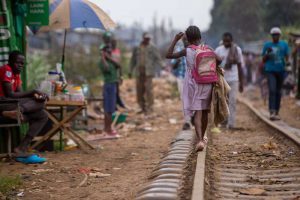 Expanding Impact While Staying True to the MissionBoard Treasurer, Francis Kibet, discusses how CFK furthered its mission while expanding its impact during 2020 and the COVID-19 pandemic. He believes that CFK's model and programs will only continue to grow.by Hannah Bain
Expanding Impact While Staying True to the MissionBoard Treasurer, Francis Kibet, discusses how CFK furthered its mission while expanding its impact during 2020 and the COVID-19 pandemic. He believes that CFK's model and programs will only continue to grow.by Hannah Bain
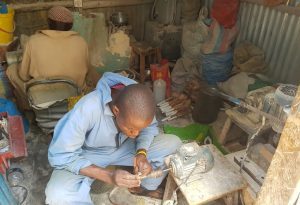 Addressing Youth Unemployment & Environmental PollutionVictorious Craft Group employs youth to turn waste into valuable products. After connecting with CFK's Entrepreneurship & Economic Development program, they were able to hire more youth and increase their impact.by Carolina for Kibera
Addressing Youth Unemployment & Environmental PollutionVictorious Craft Group employs youth to turn waste into valuable products. After connecting with CFK's Entrepreneurship & Economic Development program, they were able to hire more youth and increase their impact.by Carolina for Kibera
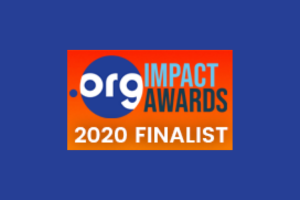 CFK Named Finalist for 2020 .ORG Impact AwardsCarolina for Kibera (CFK) is pleased to announce that we have been selected as a finalist for the 2020 .ORG Impact Awards. Winners will be announced during a 10-day event beginning November 30.by Hannah BainRead more stories
CFK Named Finalist for 2020 .ORG Impact AwardsCarolina for Kibera (CFK) is pleased to announce that we have been selected as a finalist for the 2020 .ORG Impact Awards. Winners will be announced during a 10-day event beginning November 30.by Hannah BainRead more storiesThe post Championing Affordable Access to Quality Healthcare appeared first on Carolina for Kibera.
Staff Highlight: Championing Affordable Access to Quality Healthcare

As the daughter of CFK’s co-founder, Tabitha Festo, Joy Bernice Henry feels like she is “trying to fit into shoes that are too big” for her. While Joy takes pride in upholding her mother’s legacy, she is also creating her own path and impacting the lives of many in Kibera and beyond. Growing up in Kibera, Joy experienced firsthand the health challenges stifling the community, and she was inspired to take action.
“The environment is hard. People lack access to clean water and sanitation, and you have to walk quite some distance to get to the toilets, which is paid for in some areas” Joy said.
With a soft heart and strong will, Joy decided to pursue a career in healthcare, a field that would allow her to have a direct impact on her community. She chose to study health systems management and, though her studies were difficult, she persevered and graduated with high marks.
Creating a Unique Path for Impact
After graduation, she returned to Kibera and volunteered with CFK for six months. In 2018, she received an offer for a full-time position as the Tabitha Medical Clinic Administrative Assistant, working for the same clinic that her mother started out of their 10 x 10-foot home with $26 in 2001.
Just a child when her mother established Rye Medical Clinic, renamed Tabitha Medical Clinic after Tabitha’s passing in 2004, Joy has watched the facility grow into what it is today and is proud to be a part of the team. As Tabitha Clinic’s Administrative Assistant, Joy ensures daily administrative and operations roles. She also orders critical medical and non-medical supplies for the clinic and coordinates delivery logistics, which is a large challenge due to the difficult terrain throughout Kibera. The COVID-19 pandemic has created additional challenges as many medical items are out of stock or facing delays in delivery, but Joy has adapted and worked hard to ensure that the clinic has the tools it needs to continue providing essential services to the community every day.
Over the past 19 years, Tabitha Clinic has transformed healthcare in the Kibera community. It was one of the only clinics that remained open during the post-election violence in 2007, and it is one of the only medical facilities providing consistent, high quality services during the current COVID-19 pandemic.
“Tabitha Clinic is a one-stop-shop where you can get all of the services you need,” Joy said. “Most clinics in Kibera do not offer all of that. The fact that Kibera residents have a chance to find quality and affordable healthcare makes me happy every day.”
Honoring Our Past & Pursuing Our Future
Though a fixture in the community for nearly two decades, Kiberans commonly referred to Tabitha Clinic as the CDC Clinic due to the facility’s partnership with the Centers for Disease Control and Prevention (CDC). This misnomer failed to honor the clinic’s local roots and it deterred Kiberans from visiting the facility.
Clinic staff, including Joy, agreed that a re-brand was necessary, and Joy led the initiative by ensuring that all patient-facing materials included the CFK logo and the name Tabitha Clinic. Everything from lab coats and receipt books to appointment slips carried the Tabitha name. Though branding materials helped to subtly enforce the clinic’s correct title, the most effective change was making sure that Community Health Volunteers (CHVs) used the proper name.
“They are the ones who take information outside to the community, so we encouraged them to say ‘Go to Tabitha Medical Clinic’ instead of using the term CDC Clinic,” Joy said.
While it is difficult to change people’s learned habits, Joy has noticed more community members referring to the clinic as Tabitha following the re-branding efforts. Growing up alongside CFK and Tabitha Medical Clinic, Joy has seen the organization overcome challenges, and she and many other staff take pride in the organization and Tabitha name.
“I believe my mom is smiling very big seeing how much CFK has grown and all that it has achieved,” Joy said. “As our 20th Anniversary approaches, I think it would be best to celebrate the three heroes [CFK’s co-founders] that have done so much for us and helped us get to where we are today and the power of 26 dollars.”
Moving forward, Joy hopes to see CFK expand into other communities and operate as a bridge between the communities and the government, allowing residents of informal settlements to find the quality healthcare they need at an affordable price. Joy wants to help “make the faces of these people smile” by continuing her work as a champion in health advocacy. She has made it her personal mission to ensure that all people living below the poverty line in Kenya can access quality, affordable healthcare.
Joy shares memories about her mother.
Learn more about the history of CFK and consider making a donation in Tabitha’s honor.
Stories of Progress
 Sacrificing for Success: A Tribute to Tabitha FestoTabitha's Story With $26, a personal sacrifice, and a fierce commitment to serving her community, Tabitha Atieno Festo laid the foundation...by Hannah Bain
Sacrificing for Success: A Tribute to Tabitha FestoTabitha's Story With $26, a personal sacrifice, and a fierce commitment to serving her community, Tabitha Atieno Festo laid the foundation...by Hannah Bain
 Staff Highlight: Championing Affordable Access to Quality HealthcareThe Story of Joy Bernice Henry As the daughter of CFK’s co-founder, Tabitha Festo, Joy Bernice Henry feels like she is “trying to...by Hannah Bain
Staff Highlight: Championing Affordable Access to Quality HealthcareThe Story of Joy Bernice Henry As the daughter of CFK’s co-founder, Tabitha Festo, Joy Bernice Henry feels like she is “trying to...by Hannah Bain
 Staff Highlight: Expanding Access to Education in Kibera and BeyondThe Story of Joshua Omweno There is no limit to the impact that education can have on a life, and...by Hannah Bain
Staff Highlight: Expanding Access to Education in Kibera and BeyondThe Story of Joshua Omweno There is no limit to the impact that education can have on a life, and...by Hannah BainThe post Staff Highlight: Championing Affordable Access to Quality Healthcare appeared first on Carolina for Kibera.
September 9, 2020
Expanding Access to Education in Kibera and Beyond
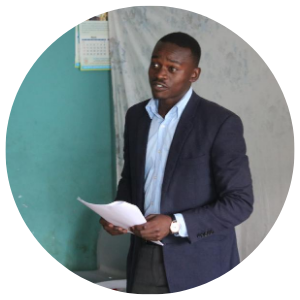
There is no limit to the impact that education can have on a life, and Joshua Omweno’s path is proof of that. A bright kid with a passion for service, Joshua received one of Carolina for Kibera’s (CFK) Angaza scholarships in 2011. Six years later, after completing secondary school and enrolling in university, Joshua began leading the very same program that had given him the opportunity to pursue higher education.
Ever since he can remember, Joshua has had a passion for service. After he graduated from high school in 2014, he decided to volunteer with the Angaza program. A dedicated volunteer, he was quickly offered an intern position, which translated into a program assistant position and, finally, a program officer position in 2017.
“I have always been passionate about serving my community and giving back to them,” Joshua said. “I really felt indebted from the support that I received through CFK, and I fit in right away.”
While working with CFK and eventually leading the Angaza Scholarship Program, Joshua also pursued his undergraduate degree at the Technical University of Kenya. Though balancing the demands of his studies and his job has been challenging, Joshua “has no regrets” about how he has spent his time during the last six years.
“The great thing about CFK is that they have always been flexible with my schedule,” Joshua said. “In turn, I have always been able to meet my deliverables. It grows to the point where you don’t feel like it’s a job anymore; it’s part of you. I have a lot of motivation waking up every day knowing that I am serving people in need. It always gives me joy to know that I am touching other’s lives.”
Impacting Lives Through Education
One of the many lives that Joshua and the Angaza program have touched was a scholarship recipient named Mary. She missed the original application deadline in 2016, but, recognizing her drive and potential, the program extended the application window, allowing her to apply and receive an interview. She was eventually recruited into the program and completed secondary school with high marks, but the program’s support did not stop there.
Joshua and the Angaza program continued to guide Mary as she applied for funding opportunities for college. They connected her to another scholarship provider supporting students enrolled in medical-related courses at the university level, and, with the program’s support, Mary received full funding for her college studies. Just last year, she graduated and began looking to start her career. She stays in touch through the Angaza Alumni program to this day.
“I am extremely satisfied seeing the success that Mary has achieved,” Joshua said. “This was a girl from a humble family who, without our intervention, may not have had the support needed to complete high school and attend college. I believe she is the only one in her family who has successfully graduated from college, and seeing her succeed in her academics and become a light within her family gives me so much joy.”
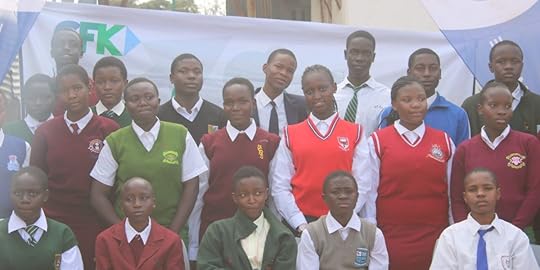 Angaza students during a past event
Angaza students during a past eventA Holistic Approach to Educational Programming
Though it is easy to focus on the students themselves when developing and implementing education programs, it is important to remember that parents play essential roles as well. They often pay their children’s school fees, provide emotional support, ensure that their children attend school, and are responsible for monitoring their children’s progress. Without including parents, education programs cannot be truly holistic or achieve their highest potential impacts. Engaging parents in student learning and progress has been especially challenging for the Angaza program, but Joshua and his team recently developed a strategy to improve communication with parents to maintain CFK’s holistic approach to programming.
“The program initiated a parents’ welfare, designed to promote the physical and material well-being of the parents of our beneficiaries,” Joshua said. “It provides small financial workshops in coordination with our Household and Economic Strengthening (HES) program to ensure that families have what they need to do things like buy necessary items and pay for student transportation to school. It also supports parents in starting or growing their own businesses. This has made them more active in our programs and led to them taking more responsibility for their children’s education and progress.”
Joshua’s experience, both as a beneficiary and as a staff member of CFK, has shaped how he approaches problems and develops solutions.
“The participatory development approach of CFK is unique,” Joshua said. “Everyone feels a part of the entire process, and community members get to drive the solutions to the problems they live with every day.”
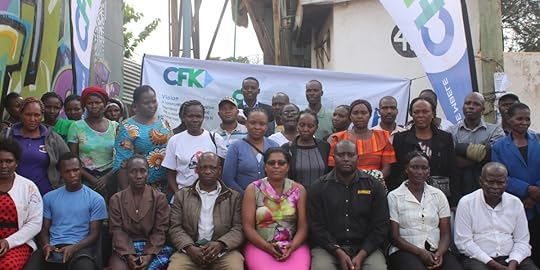 Angaza parents during a past event
Angaza parents during a past eventEnsuring Continued Learning During COVID-19
In addition to shaping the Angaza program’s holistic approach, Joshua has been on the frontlines of CFK’s COVID-19 response. There, he has adapted normal operations to ensure that all students, not just scholarship recipients, stay engaged in learning.
“Our approach has usually been reaching out directly and meeting beneficiaries, and that has been quite challenging to do since mid-March because of all of the restrictions related to the pandemic,” Joshua said. “We crafted a temporary way of bridging this gap by providing revision materials to our students to facilitate their home learning. Some of our Angaza Alumni have also led random spot checks to ensure that students are handling the new learning materials well, and when students have questions, we call parents and respond to texts. We also created WhatsApp groups to provide support.”
In addition to distributing more than 3,000 revision packet to 600 students, Angaza staff have also been supporting WaSH initiatives in student households, making liquid soap and distributing one liter of it to each student home every month. The program has distributed more than 500 liters of liquid soap to households in the community.
While Joshua has seen students make “tremendous progress” with the revision materials, facilitating at-home learning during the pandemic has also presented challenges. For example, monitoring and evaluation efforts, which are critical in all of CFK’s programs, are limited to the students who are expressing interest and actively engaging with the Angaza staff.
Over the next few months, Joshua hopes to scale-up Angaza’s response projects and establish open sessions with students. These sessions will “break the monotony of being at home” and allow students to interact with each other safely, share experiences, and engage in activities outside of academics.
“During this difficult time, we want to make sure that students are continuing to develop character skills and grow holistically,” Joshua said.
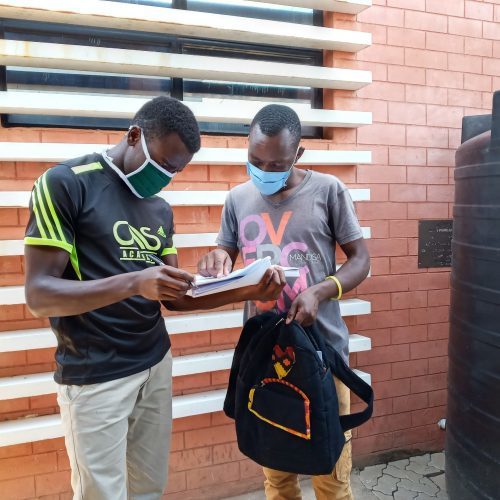
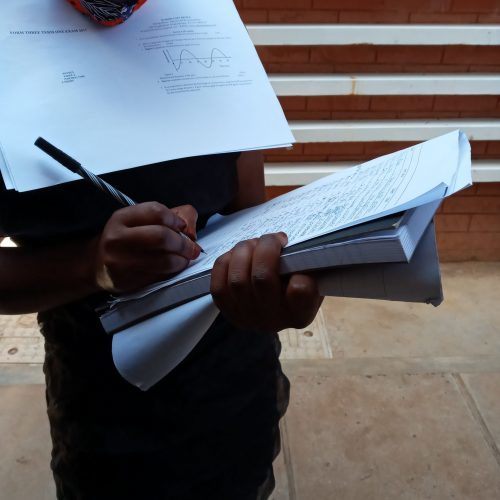
Looking Beyond Kibera
Looking beyond the COVID-19 pandemic, Joshua is eager to be part of CFK’s plans to expand and extend its support outside of Kibera. He believes that extending mentorship and career guidance services will be critical as the organization grows.
“We have had ambitious program plans in the past and have always met our targets,” Joshua said. “For example, we aimed to increase the number of students completing high school and transitioning to university, and this has been on the rise ever since. Eighty-three percent of our scholarship recipients from 2019 graduated successfully and are entering university.”
With many years of experience with the Angaza Scholarship Program, first as a beneficiary and now as a leader, Joshua recognizes the importance of education and the unique needs of young people in Kibera.
“We are working with a very important population, and every milestone is important,” Joshua said. “I believe that now we are taking little steps to make the impact of this program even bigger.”
Learn more about the Angaza Scholarship program.
Stories of Progress
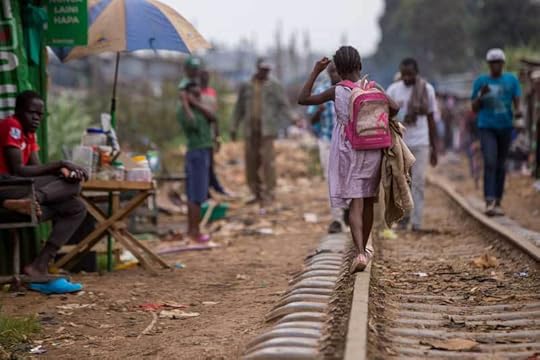 Expanding Impact While Staying True to the MissionBoard Treasurer, Francis Kibet, discusses how CFK furthered its mission while expanding its impact during 2020 and the COVID-19 pandemic. He believes that CFK's model and programs will only continue to grow.by Hannah Bain
Expanding Impact While Staying True to the MissionBoard Treasurer, Francis Kibet, discusses how CFK furthered its mission while expanding its impact during 2020 and the COVID-19 pandemic. He believes that CFK's model and programs will only continue to grow.by Hannah Bain
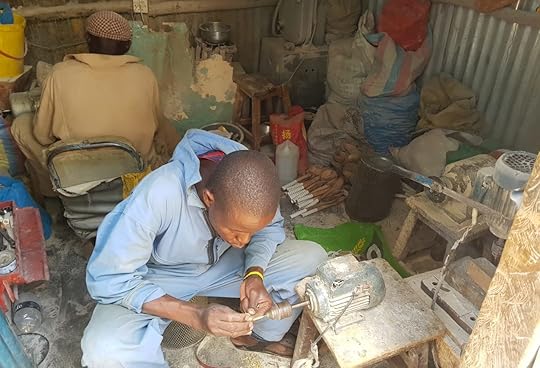 Addressing Youth Unemployment & Environmental PollutionVictorious Craft Group employs youth to turn waste into valuable products. After connecting with CFK's Entrepreneurship & Economic Development program, they were able to hire more youth and increase their impact.by Carolina for Kibera
Addressing Youth Unemployment & Environmental PollutionVictorious Craft Group employs youth to turn waste into valuable products. After connecting with CFK's Entrepreneurship & Economic Development program, they were able to hire more youth and increase their impact.by Carolina for Kibera
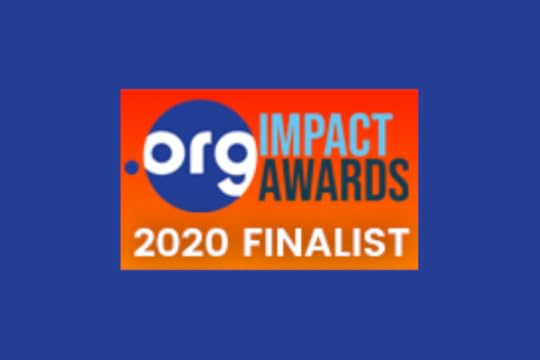 CFK Named Finalist for 2020 .ORG Impact AwardsCarolina for Kibera (CFK) is pleased to announce that we have been selected as a finalist for the 2020 .ORG Impact Awards. Winners will be announced during a 10-day event beginning November 30.by Hannah BainRead more stories
CFK Named Finalist for 2020 .ORG Impact AwardsCarolina for Kibera (CFK) is pleased to announce that we have been selected as a finalist for the 2020 .ORG Impact Awards. Winners will be announced during a 10-day event beginning November 30.by Hannah BainRead more storiesThe post Expanding Access to Education in Kibera and Beyond appeared first on Carolina for Kibera.
Staff Highlight: Expanding Access to Education in Kibera and Beyond

There is no limit to the impact that education can have on a life, and Joshua Omweno’s path is proof of that. A bright kid with a passion for service, Joshua received one of Carolina for Kibera’s (CFK) Angaza scholarships in 2011. Six years later, after completing secondary school and enrolling in university, Joshua began leading the very same program that had given him the opportunity to pursue higher education.
Ever since he can remember, Joshua has had a passion for service. After he graduated from high school in 2014, he decided to volunteer with the Angaza program. A dedicated volunteer, he was quickly offered an intern position, which translated into a program assistant position and, finally, a program officer position in 2017.
“I have always been passionate about serving my community and giving back to them,” Joshua said. “I really felt indebted from the support that I received through CFK, and I fit in right away.”
While working with CFK and eventually leading the Angaza Scholarship Program, Joshua also pursued his undergraduate degree at the Technical University of Kenya. Though balancing the demands of his studies and his job has been challenging, Joshua “has no regrets” about how he has spent his time during the last six years.
“The great thing about CFK is that they have always been flexible with my schedule,” Joshua said. “In turn, I have always been able to meet my deliverables. It grows to the point where you don’t feel like it’s a job anymore; it’s part of you. I have a lot of motivation waking up every day knowing that I am serving people in need. It always gives me joy to know that I am touching other’s lives.”
Impacting Lives Through Education
One of the many lives that Joshua and the Angaza program have touched was a scholarship recipient named Mary. She missed the original application deadline in 2016, but, recognizing her drive and potential, the program extended the application window, allowing her to apply and receive an interview. She was eventually recruited into the program and completed secondary school with high marks, but the program’s support did not stop there.
Joshua and the Angaza program continued to guide Mary as she applied for funding opportunities for college. They connected her to another scholarship provider supporting students enrolled in medical-related courses at the university level, and, with the program’s support, Mary received full funding for her college studies. Just last year, she graduated and began looking to start her career. She stays in touch through the Angaza Alumni program to this day.
“I am extremely satisfied seeing the success that Mary has achieved,” Joshua said. “This was a girl from a humble family who, without our intervention, may not have had the support needed to complete high school and attend college. I believe she is the only one in her family who has successfully graduated from college, and seeing her succeed in her academics and become a light within her family gives me so much joy.”
 Angaza students during a past event
Angaza students during a past eventA Holistic Approach to Educational Programming
Though it is easy to focus on the students themselves when developing and implementing education programs, it is important to remember that parents play essential roles as well. They often pay their children’s school fees, provide emotional support, ensure that their children attend school, and are responsible for monitoring their children’s progress. Without including parents, education programs cannot be truly holistic or achieve their highest potential impacts. Engaging parents in student learning and progress has been especially challenging for the Angaza program, but Joshua and his team recently developed a strategy to improve communication with parents to maintain CFK’s holistic approach to programming.
“The program initiated a parents’ welfare, designed to promote the physical and material well-being of the parents of our beneficiaries,” Joshua said. “It provides small financial workshops in coordination with our Household and Economic Strengthening (HES) program to ensure that families have what they need to do things like buy necessary items and pay for student transportation to school. It also supports parents in starting or growing their own businesses. This has made them more active in our programs and led to them taking more responsibility for their children’s education and progress.”
Joshua’s experience, both as a beneficiary and as a staff member of CFK, has shaped how he approaches problems and develops solutions.
“The participatory development approach of CFK is unique,” Joshua said. “Everyone feels a part of the entire process, and community members get to drive the solutions to the problems they live with every day.”
 Angaza parents during a past event
Angaza parents during a past eventEnsuring Continued Learning During COVID-19
In addition to shaping the Angaza program’s holistic approach, Joshua has been on the frontlines of CFK’s COVID-19 response. There, he has adapted normal operations to ensure that all students, not just scholarship recipients, stay engaged in learning.
“Our approach has usually been reaching out directly and meeting beneficiaries, and that has been quite challenging to do since mid-March because of all of the restrictions related to the pandemic,” Joshua said. “We crafted a temporary way of bridging this gap by providing revision materials to our students to facilitate their home learning. Some of our Angaza Alumni have also led random spot checks to ensure that students are handling the new learning materials well, and when students have questions, we call parents and respond to texts. We also created WhatsApp groups to provide support.”
In addition to distributing more than 3,000 revision packet to 600 students, Angaza staff have also been supporting WaSH initiatives in student households, making liquid soap and distributing one liter of it to each student home every month. The program has distributed more than 500 liters of liquid soap to households in the community.
While Joshua has seen students make “tremendous progress” with the revision materials, facilitating at-home learning during the pandemic has also presented challenges. For example, monitoring and evaluation efforts, which are critical in all of CFK’s programs, are limited to the students who are expressing interest and actively engaging with the Angaza staff.
Over the next few months, Joshua hopes to scale-up Angaza’s response projects and establish open sessions with students. These sessions will “break the monotony of being at home” and allow students to interact with each other safely, share experiences, and engage in activities outside of academics.
“During this difficult time, we want to make sure that students are continuing to develop character skills and grow holistically,” Joshua said.


Looking Beyond Kibera
Looking beyond the COVID-19 pandemic, Joshua is eager to be part of CFK’s plans to expand and extend its support outside of Kibera. He believes that extending mentorship and career guidance services will be critical as the organization grows.
“We have had ambitious program plans in the past and have always met our targets,” Joshua said. “For example, we aimed to increase the number of students completing high school and transitioning to university, and this has been on the rise ever since. Eighty-three percent of our scholarship recipients from 2019 graduated successfully and are entering university.”
With many years of experience with the Angaza Scholarship Program, first as a beneficiary and now as a leader, Joshua recognizes the importance of education and the unique needs of young people in Kibera.
“We are working with a very important population, and every milestone is important,” Joshua said. “I believe that now we are taking little steps to make the impact of this program even bigger.”
Learn more about the Angaza Scholarship program.
Stories of Progress
 Staff Highlight: Expanding Access to Education in Kibera and BeyondThe Story of Joshua Omweno There is no limit to the impact that education can have on a life, and...by Hannah Bain
Staff Highlight: Expanding Access to Education in Kibera and BeyondThe Story of Joshua Omweno There is no limit to the impact that education can have on a life, and...by Hannah Bain
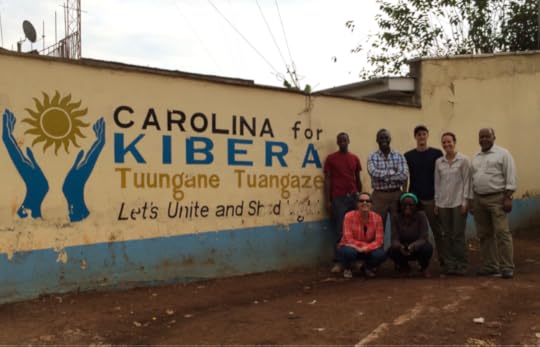 Board Highlight: Creating Global AmbassadorsThe Story of Jennifer Coffman On one afternoon in 1999, Carolina for Kibera (CFK) co-founder Rye Barcott, then an undergraduate student at...by Hannah Bain
Board Highlight: Creating Global AmbassadorsThe Story of Jennifer Coffman On one afternoon in 1999, Carolina for Kibera (CFK) co-founder Rye Barcott, then an undergraduate student at...by Hannah Bain
 Three Fundraisers, One Common GoalThree Countries, Three Approaches, One Goal With nearly 20 years of experience working with Kiberan community members as well as international students,...by Hannah Bain
Three Fundraisers, One Common GoalThree Countries, Three Approaches, One Goal With nearly 20 years of experience working with Kiberan community members as well as international students,...by Hannah BainThe post Staff Highlight: Expanding Access to Education in Kibera and Beyond appeared first on Carolina for Kibera.
September 2, 2020
Three Fundraisers, One Common Goal
With nearly 20 years of experience working with Kiberan community members as well as international students, professionals, and organizations, Carolina for Kibera (CFK) has developed a diverse group of dedicated donors and fundraisers. The creativity of our supporters inspires us every day, and we would not be able to do the work that we do without them. This year, in honor of the International Day of Charity, we are sharing the stories of three of our current fundraisers. From running one mile per day to writing a memoir to establishing and raising money for a program, each of these individuals has adopted a creative approach to fundraising. Though they are from three different countries, have independent goals, and use unique approaches, they share a similar drive to make a difference and increase their individual impacts. These individuals have found new ways to connect with their communities, having an impact on their network in addition to the Kibera community.
Run for Change: Beatrice Corio
One day, 14-year-old Beatrice found a bag of coins in her mother‘s car and wanted to donate it to a good cause. Since her mother worked with CFK co-founder Rye Barcott, Beatrice decided to learn more about the organization and eventually donated the money to CFK. Beatrice was impressed with CFK‘s mission and positive impact, especially within the Girls Empowerment Program (GEP). She believes that attending secondary schooling exponentially increases the opportunities for a girl’s future. Recognizing her privilege to attend a multicultural boarding school in the United States, she wanted to help someone who did not have the same advantages. In 2019, Beatrice raised $125 going door-to-door and collecting change for CFK‘s GEP.
Beatrice was eager to raise more funds in 2020, but the COVID-19 pandemic made going door-to-door for coin collection problematic. Instead, Beatrice, who does not classify herself as a runner, decided to commit to running one mile every day for a month. She set-up a Peer-to-Peer fundraising page and solicited sponsorship from family, friends, and local networks. Her goal was to raise $600 to provide a Kiberan girl with an opportunity to pursue secondary education through CFK’s Angaza Scholarship program. Beatrice was nervous about having a goal almost five times what she raised the previous year, but she met this goal in two days. At the conclusion of her fundraiser, Beatrice exceeded her goal by $208, allowing her to provide additional support to a Kiberan student.
Beatrice enjoyed the online platform vs. going door-to-door as it allowed her to reach a broader audience and involve family and friends from outside of her immediate community.
“The most enjoyable part of the fundraiser was observing the enormous generosity and surpassing my goal before officially starting to run,“ Beatrice said. The biggest challenge was staying motivated to run every day despite the conditions. “It has been a daily challenge, but I came to enjoy it a lot more than I thought I would,“ Beatrice said. While Beatrice took some time off after the fundraiser, she plans to continue running, just not every day. For anyone considering hosting a fundraiser, Beatrice said that “the most important aspect is to believe in the cause you are supporting. The result is more rewarding when you care and want to see it happen.“ Beatrice plans to host an annual fundraiser so that she can support the secondary education of a Kiberan student in its entirety.
Check out Beatrice’s Fundraiser and learn more about CFK’s Girls Empowerment Program.
Leave Only Footprints: Jaihind Sumal
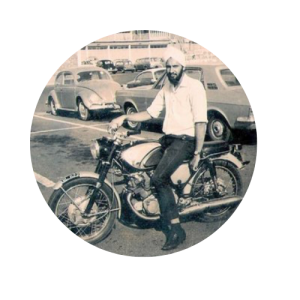
Kenyan who has lived in England and Germany, Jaihind retired from a long career in engineering and currently resides in the United States. His parents, born in colonial Inda, were compelled by tragedy at a very young age to build a new life in Kenya. Jaihind was born in racially segregated Kenya, experiencing the injustice and cruelty of colonial rule and the pain of the Mau Mau rebellion fighting for Kenya‘s independence. Racial divisions in Kenya created challenges. “At the time, society in Kenya was split into three racial groups (Europeans, Asians, and Africans), as opposed to two in most other countries,“ Jaihind stated.
The generation of Kenyans born to Indian immigrants is now aging, and Jaihind wanted to capture this unique period of Kenyan history before it was forgotten with the passage of time. He started to compile information in preparation for writing a book. In 2019, he wrote he and his father’s memoir, Leave Only Footprints, detailing the lives of Indian Migrants in Kenya. The book captures personal stories as seen through the eyes of two generations of a family, in their historical context. While Jaihind left Kenya in 1968, he wanted to give back to the country where he grew up and to the people of Kenya who gave him a wonderful childhood that he will never forget. “To see them suffer in their own country was so painful, so I wanted to give back.“ Donating the proceeds of his book seemed the best way to do this. He was familiar with Kibera, and when he came across CFK, he believed that the organization best fit the needs of the community. Jaihind donates 100% of the proceeds from his book to CFK. Like Beatrice, he agrees that dedication to the cause is essential when conducting a fundraiser. “For me, it is a passion for the country and a desire to do something to address the suffering in that country,“ Jaihind said.
Jaihind’s book is available on Amazon.
Matura Project: Line Cottier
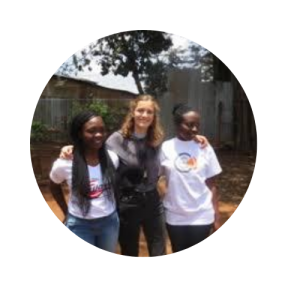
While traveling with her family, Line began noticing that girls in other countries were living a life different from her own in Switzerland. As a nine-year-old vising Kibera with her family, Line recalled seeing a young girl, barely twelve years old, carrying a baby on her back. At that moment, she decided something needed to be done about injustices facing girls around the world. Today, the 19-year–old’s biggest dream is for everyone to have equal chances, especially regarding education.
In Switzerland, students complete a Matura (capstone) project at the end of secondary school. After her experiences in other countries, Line knew she wanted to focus her project on gender equality. She began searching for implementation partners in Kibera, where she connected with CFK‘s Girls Empowerment Program (GEP). “[I] had only heard good things [about CFK],” Line said. “They were very professional, inspired, and motivated people. The people who work there want to do something for a good cause. They are devoted to the mission.“ Working with CFK staff, Line began crafting a project proposal for fundraising. Her initial fundraising goal was 15,000 francs ($16,500) to cover the two-year project. Line began reaching out to family, her personal networks, foundations, and local civil and religious groups. She estimated it would take months to collect the money, but she reached her goal within three weeks. She used the extra time to solicit further funding. In the end, Line raised 35,000 francs ($38,500), which allowed her to scale up the project, reaching more students. “[Fundraising] was an amazing and gratifying experience,” Line reflected.
Line’s project extends the GEP to include male engagement strategies. “Half of the population and a large source of the problem are males, and they need to be a part of the discussion” Line stated. The male-centered programs not only address issues surrounding gender equality but also drugs, HIV, and reproductive health. The program began in the Spring of 2018, and the pilot was expected to last for two years. CFK staff operates the program in Kibera and Line conducts bi-monthly progress and fund allocation check-ins. Her favorite part of the process was visiting Kenya and seeing the enthusiasm surrounding the project from both student beneficiaries and staff. As a result of the COVID-19 disruption, Line collected additional funds to support CFK’s COVID-19 response. Long-term, Line hopes the program will continue to expand to more schools in Kibera. Inspired by the success in Kenya, Line wants to implement similar programming in Switzerland. Despite the success of the project, the process presented many challenges. Due to the distance, it was hard to stay on top of program implementation.
“I tried to organize Skype interviews, but sometimes we had technical issues.” Line said. “Sometimes it was also difficult for us to understand one another because of our different accents. As a 17-year-old [running a project of this scale] was a whole new thing for me.”
For anyone who is considering organizing a fundraiser, Line had a few recommendations. “Never give up,” she said. “It can be tough but remind yourself why you are doing this. Conveying the passion and energy I put into the project and why it is important to me [helped me secure funding].”
Get Connected
There are many opportunities to support CFK. Through a single donation, monthly giving, peer-to-peer fundraising, a productive partnership, company gift matching, or an original fundraising idea, you have the ability to make a difference. No amount is too little – $5 can purchase pads, sanitary tissues, panties, and WASH supplies such as soap, $10 per month can help teenage mothers re-enroll in school, and $25 per month supports feeding programs and immunizations for severely malnourished children under five.
Interested in launching a peer-to-peer fundraising campaign or want to share an idea for a partnership or fundraiser? We are an organization built on relationships, and we enjoy engaging with our supporters in new and innovative ways. Send us an email at admin@carolinaforkibera.org or reach out to us on Facebook, Twitter, Instagram or LinkedIn.
Stories of Progress
 Three Fundraisers, One Common Goalby Hannah Bain|02 September 202003 September 2020
Three Fundraisers, One Common Goalby Hannah Bain|02 September 202003 September 2020
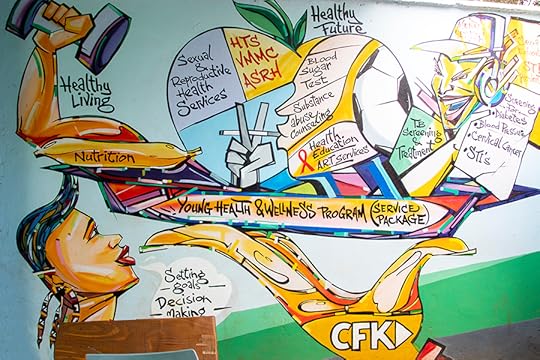 The Power of Positive Communication During the COVID-19 Pandemicby Carolina for Kibera|17 August 202019 August 2020
The Power of Positive Communication During the COVID-19 Pandemicby Carolina for Kibera|17 August 202019 August 2020
 On the Ground: Young People Perform Vital Work on the Frontlines of COVID-19 Response in Kiberaby Carolina for Kibera|11 August 202028 August 2020View More Stories
On the Ground: Young People Perform Vital Work on the Frontlines of COVID-19 Response in Kiberaby Carolina for Kibera|11 August 202028 August 2020View More StoriesThe post Three Fundraisers, One Common Goal appeared first on Carolina for Kibera.
August 28, 2020
Board Highlight: Creating Global Ambassadors
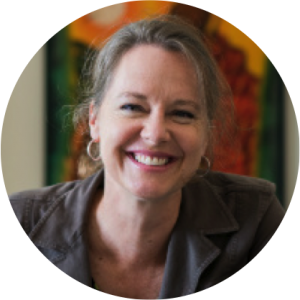
On one afternoon in 1999, Carolina for Kibera (CFK) co-founder Rye Barcott, then an undergraduate student at the University of North Carolina at Chapel Hill (UNC), walked into Jennifer Coffman’s office with big ambitions and a drive to make a difference. Neither of them knew that their conversation would lay the foundation for CFK a few years later.
A graduate student in anthropology at the time, Jennifer had been connected to Rye because he wanted to study ethnic violence in East Africa and take graduate-level courses during his first few semesters of undergraduate study.
“I knew he was committed or I wouldn’t have bothered with him after his freshman year,” Jennifer joked.
With experience conducting research in informal settlements, Jennifer introduced Rye to Kibera, which was recognized as one of the most rapidly expanding informal settlements in Kenya in the late 1990s. After connecting with Jennifer, Rye organized a research initiative with UNC to study youth leadership and ethnic violence in Kibera. During his research, he met Tabitha Festo, a Kiberan nurse, and Salim Mohamed, a Kenyan community organizer. Two years later, the three co-founded CFK.
Jennifer continued to conduct research in East Africa as she completed her Ph.D. in Anthropology, and, on one of her visits to Kibera in 2001, Rye introduced her to Tabitha.
The Evolution of CFK & The Importance of Humility
Jennifer has remained a part of CFK’s story for more than 19 years. She currently serves on the organization’s Board of Directors and also served three terms as Chair of the U.S. Board of Directors. Though CFK has faced challenges during its nearly two decades of service, Jennifer has watched it learn and grow into the well-respected NGO that it is today.
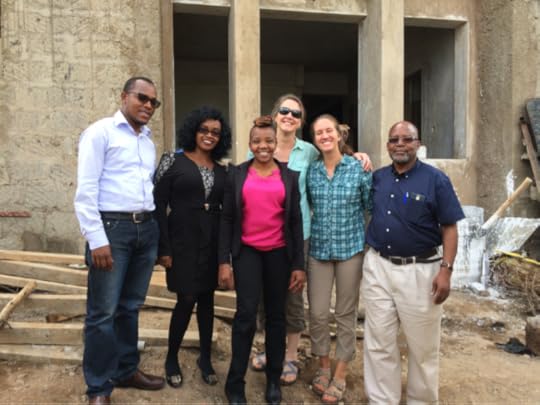 May 2017 at base of Binti Center during construction.
May 2017 at base of Binti Center during construction.“Some of CFK’s most difficult times were some of the best learning experiences because the organization is focused, and it admits and learns from its mistakes,” Jennifer said. “I believe that the best monitoring and evaluation an organization can do is to document things that went poorly and share them with others. Not many organizations want to do that because they find it shameful, but that honesty is extremely refreshing and helpful, especially in research fields.”
In addition to CFK’s ability and desire to continuously improve, Jennifer believes that the organization’s leaders have been essential to keeping it grounded in integrity.
“I have never heard Rye speak [about CFK] without talking about the other co-founders,” she said. “I think that message is incredibly important, especially when thinking about collaboration between staff and board members in the U.S. and Kenya.”
Though part of the Board of Directors and involved in guiding many important decisions for the organization, Jennifer shares much of the same humility as Rye and takes little credit for the impact that CFK has achieved.
“As a board member, even if you have a great idea, it doesn’t matter if you don’t have the right people on the ground to make it work,” she said. Further, she has learned a tremendous amount from CFK staff and volunteers over the years.
CFK’s Board of Directors includes diverse American and Kenyan leaders who meet once per quarter and assist staff in Kibera by providing guidance, facilitating connections, and supporting fundraising efforts. The organization also recently convened an Advisory Council, composed of internationally recognized leaders, including 64th U.S. Secretary of State Madeleine Albright, to support CFK in addressing the challenges presented by the COVID-19 pandemic and to assist the organization in fulfilling its mission.
Creating Global Ambassadors
Jennifer now teaches at James Madison University, inspiring other young people to become global ambassadors for positive change. In addition to teaching in the U.S., she leads the East Africa Field School summer program, providing an opportunity for students to study Swahili and human-environment interactions in Kenya and Tanzania during an intensive eight-week program, which includes a visit to CFK in Kibera. Jennifer also teaches a module on CFK in one of her classes, directly connecting dozens of new students to the organization every year.
 Photo from June 2016 visit – standing from left to right: Martin Mayiani (from Lenkisem and worked with me/JMU program), Julian Rowa (former CFK ED), Hunter Hart and Rachel Palkovitz former EAFS students and program assistants, David Mshila, former CFK-Kenya board chair; kneeling from left to right: Jennifer Coffman, Judy Kiprop (Jennifer's friend and also an EAFS Kiswahili teacher)
Photo from June 2016 visit – standing from left to right: Martin Mayiani (from Lenkisem and worked with me/JMU program), Julian Rowa (former CFK ED), Hunter Hart and Rachel Palkovitz former EAFS students and program assistants, David Mshila, former CFK-Kenya board chair; kneeling from left to right: Jennifer Coffman, Judy Kiprop (Jennifer's friend and also an EAFS Kiswahili teacher) During the pandemic of 2020 and with classes moved online, Executive Director Hillary Omala presented to one of Jennifer’s classes and participated in a question and answer session with the students over Zoom. After taking Jennifer’s class and learning from Hillary this year, one student was inspired and set up a monthly donation to CFK while others led fundraisers via social media.
While many of Jennifer’s students end up donating to CFK, she doesn’t teach the module to fundraise; she teaches it because she believes in the power of passionate students and their abilities to continue to educate those in their own friend and family networks.
“Students can talk about CFK but also discuss global stories about poverty and inequality,” Jennifer said. “They are some of the best ambassadors for the program.” Likewise, donors who support scholarships for Kibera’s students open up further opportunities for Kiberan youth and educators by investing in quality formal education.
Jennifer is excited to continue supporting CFK as it enters a new decade of service in 2021. She believes that the Binti Pamoja Centre, Girls’ Empowerment Program, and sexual and reproductive health programming will continue to evolve and remain a focus of the organization, especially since high teenage pregnancy and fertility rates can exacerbate social issues and gender inequalities in Kibera.
“I’m happy that I am still part of [CFK’s] story, and I look forward to celebrating how far we have come during the organization’s 20th anniversary next year,” Jennifer said.
Learn more about the history of CFK and consider making a monthly donation to support our ongoing work.
Stories of Progress
 Board Highlight: Creating Global AmbassadorsThe Story of Jennifer Coffman On one afternoon in 1999, Carolina for Kibera (CFK) co-founder Rye Barcott, then an undergraduate student at...by Hannah Bain
Board Highlight: Creating Global AmbassadorsThe Story of Jennifer Coffman On one afternoon in 1999, Carolina for Kibera (CFK) co-founder Rye Barcott, then an undergraduate student at...by Hannah Bain
 The Power of Positive Communication During the COVID-19 PandemicThe role that positive communication strategies can play in efforts to mitigate the coronavirus. by Valerie Lucas The number of COVID-19...by Carolina for Kibera
The Power of Positive Communication During the COVID-19 PandemicThe role that positive communication strategies can play in efforts to mitigate the coronavirus. by Valerie Lucas The number of COVID-19...by Carolina for Kibera
 On the Ground: Young People Perform Vital Work on the Frontlines of COVID-19 Response in KiberaYoung people in Kibera are creative, innovative, and energetic and have devised ways to ensure continued health and education services in Kibera during the pandemic. by Carolina for Kibera
On the Ground: Young People Perform Vital Work on the Frontlines of COVID-19 Response in KiberaYoung people in Kibera are creative, innovative, and energetic and have devised ways to ensure continued health and education services in Kibera during the pandemic. by Carolina for KiberaThe post Board Highlight: Creating Global Ambassadors appeared first on Carolina for Kibera.
August 17, 2020
The Power of Positive Communication During the COVID-19 Pandemic
by Valerie Lucas
The number of COVID-19 cases continues to grow in both Kibera and Kenya, demanding innovative responses from the public and private sectors. On March 12th, Kenya recorded its first case of COVID-19, and, as of August 18, 2020, current cases number 30,365 according to the Kenyan Ministry of Health. Nairobi’s largest informal settlement, Kibera, has seen approximately 900 cases of COVID-19 so far and is considered an emerging hotspot in the capital. Kibera has experienced a significant increase in daily reported cases in the country, which is no doubt an underestimate of the actual case count in Kibera, where current testing is inadequate and individuals have limited access to health care services. Of the more than 1,800 tests that CFK has issued, approximately 18.9% have come back positive, more than the 10% positive benchmark that indicates adequate testing. CFK has been part of the rapid response to the pandemic and will continue to work within the Kibera community throughout the pandemic and beyond.
Communication is critical during public health crises, particularly pandemics, which require wide-scale cooperation in practicing sanitation, wearing masks, and social distancing as much as possible. Of course, because of two centuries of resource extraction and labor exploitation, the Kibera community does not have all that it needs to handle the coronavirus pandemic. For example, most Kibera community members are unable to fully social distance because of overcrowded living conditions; 10-by-10-foot structures often house eight to 10 people. However, temporary behavioral changes to reduce viral transmission can certainly save lives in Kibera.
Dispelling Myths & Misconceptions Surrounding the COVID-19 Pandemic
Accurate messaging to combat myths and reduce community spread of the virus has become one of CFK’s foremost challenges during this coronavirus pandemic. Though myths about COVID-19 are widespread in Kibera, they are not unique to the community. Recipes for unproven homemade cures, misinformation about community vulnerability, and conspiracy theories about the source of coronavirus have abounded across the globe. Among the more damaging myths in Kibera are those that minimize the seriousness of the virus, falsely claiming that COVID-19 can only affect people in high-income countries, or that being HIV positive blocks coronavirus infections.
To encourage a strong public response to the threat of coronavirus, CFK has been working on best-practice communication tools. The severity of the pandemic has made it difficult for all of us to understand the right steps to take, but one of our new strategies includes positive messaging. Jenny Konkin of the Whole Way House introduced a new communication approach during the Innovation and Hope webinar from the University of British Columbia’s Office of Regional and InternationalCommunity Engagement. The Whole Way House has been focusing on the positive when developing signage and educating others, a strategy that could be useful and effective in Kibera.
Encouraging safe means of connection and highlighting the strength of the Kibera community effort can go a long way. Staying away from others may not always be possible in Kibera, which has an estimated 350,000 people in just five square kilometers, but there are certainly steps that everyone can take to reduce transmission of COVID-19. Communication should not diminish the difficult reality of the situation, which is that of a community that needs much more than it currently has to combat the coronavirus, but it should focus on what people could be doing and should provide them with encouragement in their daily lives.

The Power of Positive Communication
Communication researchers have validated this positivity-focused approach. Messaging that spotlights the positive can be just as effective as messaging that emphasizes potentially negative outcomes, according to Positive Communication in Health and Wellness, a book on positive communication co-edited by UA researcher Margaret Pitts and colleague Thomas J. Socha. CFK’s messaging can also provide hope and encouragement in Kibera while effectively informing how people can respond to COVID-19.
Over the last few months, CFK implemented signage complimenting people on their masks, encouraging elbow bumps and waving from a healthy one-meter distance, and demonstrating how to make homemade soap to promote handwashing. These efforts are of course combined with psychosocial support and home handwashing kits that CFK has been distributing to make these steps more practical for the residents of Kibera.
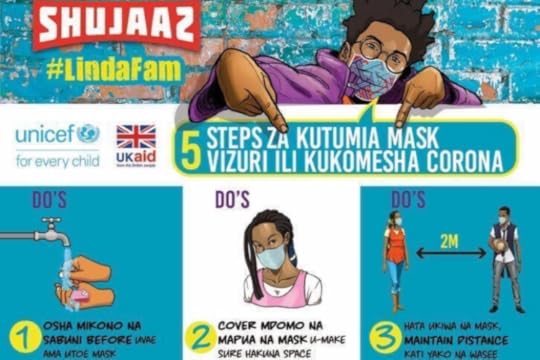
Mitigating the COVID-19 pandemic requires community buy-in and cooperation, and that cannot be achieved without accurate messaging and effective communication strategies. In the current global environment full of fear, skepticism, and uncertainty, positive communication might be just what we need.
You can help by financially supporting the development of these positive communication materials.
Stories of Progress
 The Power of Positive Communication During the COVID-19 Pandemicby Carolina for Kibera|17 August 202018 August 2020
The Power of Positive Communication During the COVID-19 Pandemicby Carolina for Kibera|17 August 202018 August 2020
 On the Ground: Young People Perform Vital Work on the Frontlines of COVID-19 Response in Kiberaby Carolina for Kibera|11 August 202013 August 2020
On the Ground: Young People Perform Vital Work on the Frontlines of COVID-19 Response in Kiberaby Carolina for Kibera|11 August 202013 August 2020
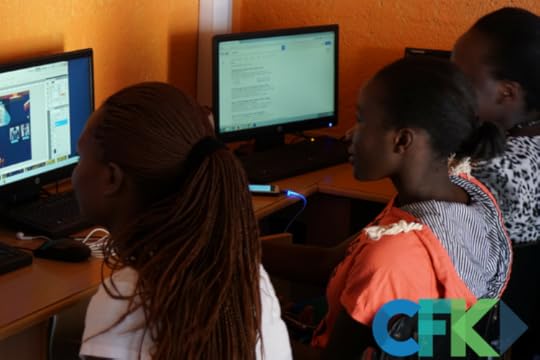 Board Highlight: Thinking Beyond Education to Empower Communitiesby Hannah Bain|06 August 202015 August 2020Read more Stories
Board Highlight: Thinking Beyond Education to Empower Communitiesby Hannah Bain|06 August 202015 August 2020Read more StoriesThe post The Power of Positive Communication During the COVID-19 Pandemic appeared first on Carolina for Kibera.
August 11, 2020
On the Ground: Young People Perform Vital Work on the Frontlines of COVID-19 Response in Kibera
By Mercy Owuor, Head of Research Policy and Development at Carolina for Kibera
COVID-19 has adversely disrupted daily life in Kenya and the world over. Education and health services resources are being diverted to manage the crisis, and as governments implemented lockdown measures, many people have been left without a source of livelihood. UNESCO estimates that the closure of schools has impacted more than 861.7 million children and youth while unemployment has risen three times higher than the Great Recession.
In Kenya, a survey conducted by the Kenya National Bureau of Statistics (KNBS) found that 9 out of 10 Kenyans are unsure whether they will return to work. Many of those that have returned to work have still been forced to take pay cuts. This statistic is much worse for people working in the service industry and informal sector, which is where the majority of Kibera residents secure their income.

Carolina for Kibera (CFK), a local non-governmental organization based in Nairobi, Kenya, is working with young people to mitigate the challenges created by the COVID-19 pandemic. As cases continue to rise, Kibera, an informal settlement, is particularly at-risk and has been listed as one of the hotspots in the city. But young people are not sitting idle and waiting for the worst to come. They have been productive, working on the frontlines and performing vital work such as developing clear messaging around COVID-19, maintaining health care services, and ensuring students continue to learn even if they are unable to attend school.
“Young people can play a vital role in COVID-19 response,” said Elmard Rigan, a psychologist, motivational speaker, and one of CFK’s young leaders. “My services are vital because I not only serve the current population but I’m working to build hope for tomorrow’s generation. The future depends on our actions today.”
Developing Clear COVID-19 Messaging to Encourage Participation in Screening
CFK is following the Centers for Disease Control (CDC) and World Health Organization (WHO) guidance on COVID-19 mitigation. The CDC explains the purpose behind testing: “Viral tests are used in community, outpatient, and hospital-based surveillance systems to identify cases of SARS-CoV-2 infection. These data help identify areas of ongoing circulation (hot spots), determine trends in disease by location, provide insight into the impact of the disease over time and by location, and inform disease forecasts.”
On March 26, when the first case of COVID-19 was reported in Kibera, young men and women mobilized the community to participate in free COVID-19 screening at CFK’s Tabitha Medical Clinic, one of the few testing sites in Kibera. With all the myths, misconceptions and conspiracy theories surrounding the disease, the community was skeptical about rumors and news reports. It took a great deal of effort to convince people to come to the Tabitha Medical Clinic for screening, but CFK staff and volunteers did a great job communicating why screening for the disease was critical.
In Kibera, when the first positive results were delivered, government contact tracers and ambulances visited the community to gather individuals with positive COVID-19 test results. The individuals with positive results were unaware of the quarantine process. Fortunately, our CFK frontline youth who also call Kibera home were able to share information to instill trust and faith in the process.
Maintaining Access to Health Services and Mitigating the Pandemic
Young people in Kibera are creative, innovative, and energetic and have devised ways to ensure continued health and education services in Kibera during the pandemic. CFK manages tens of thousands of clinic visits annually, providing vaccinations, sexual and reproductive health services, counseling, x-ray services, and more. Staff and volunteers are working around the clock to ensure the community continues to receive these essential services throughout the pandemic.
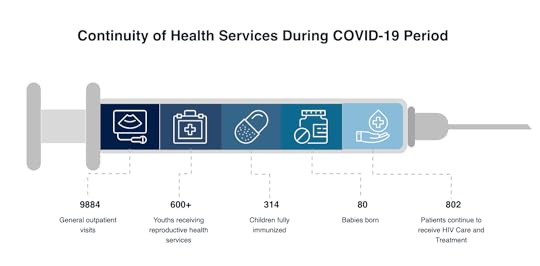
Joy Bernice, a health systems college graduate and CFK staff member at Tabitha Clinic, is putting her education and skills to work. She has teamed up with other young leaders and community health workers to ensure uninterrupted health care delivery. She is coordinating with suppliers and staff to provide health care workers and the community with supplies needed to protect themselves and to prevent the spread of COVID-19. Joy is continually on the ground coordinating work at Tabitha Clinic and serves as a vital link between the community and the health facilities.
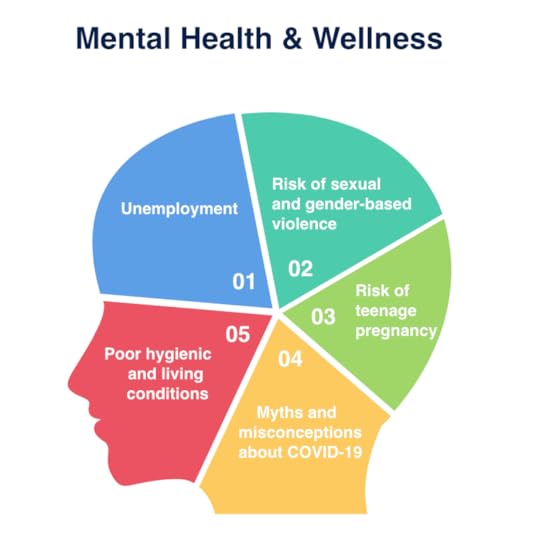
As the adverse effects of the pandemic continue, emotions are high and families are struggling to get by, which can lead to an increase in mental health issues. To meet the growing need, CFK youth staff are offering mental health and wellness counselling services and alleviating food insecurity by delivering supplies to the most vulnerable households. Adhering to proper social distancing protocols, they are also delivering hygiene kits to adolescent and young girls to reduce the risk of sexual and gender–based violence and unwanted pregnancies. Staff continues to offer sexual and reproductive health services through CFK’s Young Health and Wellness Centre.
CFK’s team is also training community members to make soap, and they are developing information and communication (IEC) materials for use on social media and WhatsApp to deliver accurate health information. They have distributed more than 400 locally made jerry cans with taps for handwashing and are delivering and helping to install taps at individual households. They are also continuously disinfecting public areas to reduce the spread of the virus.
Ensuring Continued Learning Among Students in Informal Schools
With the closure of schools and the increasing unrest, the pandemic has further exposed the resource gap between private and informal schools. For example, the majority of students from low socio-economic backgrounds who attend public and informal schools do not have access to virtual learning made available to students in private schools. The Kenyan government has issued guidelines for schools to tentatively reopen in January, and all students are expected to repeat their grades. Even with this directive, students from private schools continue to be engaged through virtual learning while the rest from public and informal schools are left with no alternative. Despite the challenges, CFK’s team of young leaders has been ensuring students in Kibera are engaged and continue to learn during this period.
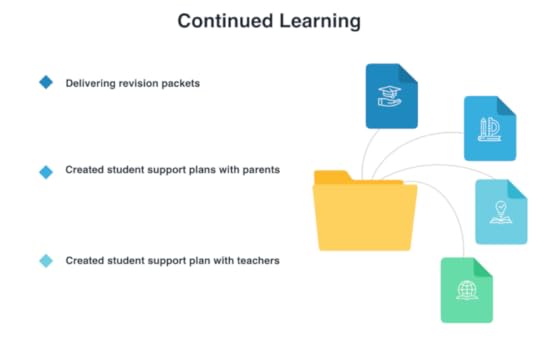
Having grown up in Kibera, Joshua Omwena, a construction student and an education enthusiast, understands the resource challenges and educational divide in his community. He has been working with other young people to ensure children from Kibera continue learning throughout the pandemic by providing educational revision materials for home use to 1,653 students. Staff are also utilizing technology and have developed a parent and teacher group on WhatsApp to manage student activity.
Through their actions and service throughout this challenging crisis, Elmard, Joy, and Joshua and many others like them have demonstrated that they too can lead. CFK is empowering young people to drive social progress in Kibera through new and innovative projects. If tapped and nurtured, they can make an incredible impact, even in challenging crises.
#youthday #youngleaders
Learn more about our youth empowerment programs and consider supporting our youth leaders in their efforts to fight the COVID-19 pandemic in Kibera.
Stories of Progress
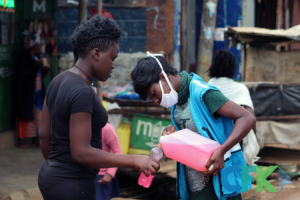 On the Ground: Young People Perform Vital Work on the Frontlines of COVID-19 Response in Kiberaby Carolina for Kibera|11 August 202012 August 2020
On the Ground: Young People Perform Vital Work on the Frontlines of COVID-19 Response in Kiberaby Carolina for Kibera|11 August 202012 August 2020
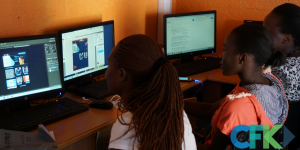 Board Highlight: Thinking Beyond Education to Empower Communitiesby Hannah Bain|06 August 202006 August 2020
Board Highlight: Thinking Beyond Education to Empower Communitiesby Hannah Bain|06 August 202006 August 2020
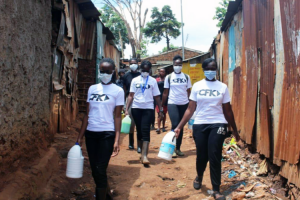 CFK Healthcare Staff Featured as Frontline Heroesby Hannah Bain|22 July 202022 July 2020View more Stories
CFK Healthcare Staff Featured as Frontline Heroesby Hannah Bain|22 July 202022 July 2020View more StoriesThe post On the Ground: Young People Perform Vital Work on the Frontlines of COVID-19 Response in Kibera appeared first on Carolina for Kibera.
August 6, 2020
Board Highlight: Thinking Beyond Education to Empower Communities
Growing up in Kibera, Dickson Omondi developed an appreciation for development work and an in-depth understanding of the complex challenges facing his community. In his youth, he saw many of his peers experiment with drugs and alcohol, become involved in crime, or become pregnant and drop out of school. Some of his friends, even though academically capable or talented in sports and arts, succumbed to hopelessness and the heavy weight of poverty.
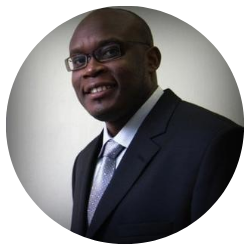
“Back then, only a few from Kibera slums would qualify to go to university, and in a context in which the labor market prioritized educational achievement, many remained trapped in a vicious cycle of poverty, unable to achieve their full potential,” he said. “School made me aware of the have and the have nots, the challenges of social inequalities, and I became interested in learning about how someone can move out of abject poverty and fully realize their potential and secure minimum guarantees of good health, adequate nutrition, housing, and other basic needs.”
Thinking Beyond Education
Though Dickson recognized that access to education is a significant factor in breaking the cycle of poverty, he emphasized that youth in Kibera needed more to build resilience and a strong character as well as nurture their talents in sports and arts. They needed social programs that met their unique needs and kept them engaged while teaching skills that would make them competitive in the job market and encourage them to utilize their talents and abilities
“Most people in Kibera don’t have the time or the resources to think about developing specific skills to make them competitive in the job market,” Dickson said. “They are worried about how they are going to put bread on the table if they don’t have a job or how they are going to keep their families healthy and meet other basic needs. They mostly then end up operating at their lowest potential due to these external factors.”
From Dickson’s perspective, one of the most valuable and innovative CFK programs is its information and computer technology workshops.
“The program teaches our young people how to use computers, which gives them skills that can help them as they enter the job market,” Dickson said, “but it also keeps them engaged, which can prevent them from getting into trouble and help them avoid many other pitfalls.”
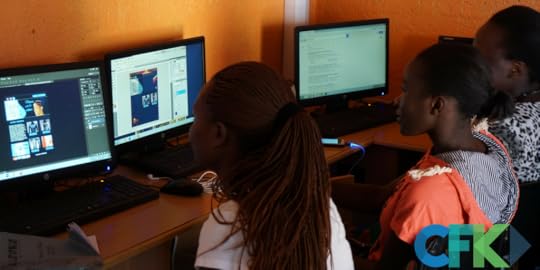
The Power of Holistic Programs
Though Dickson has a soft spot for our computer technology programs, he believes that what truly makes CFK’s work effective are its relevant interventions, productive partnerships, and holistic approach. Issues facing the Kibera community, including poverty, poor sanitation, food insecurity, and more, overlap and are multi-layered. It is impossible to separate these issues from each other, which highlights the need for complementary services and holistic programming.
“To have a real impact, you have to think about families and the issues they are dealing with,” Dickson said. “One family may need mentorship for their daughter, a job for their son, and pre–and post-natal care for their pregnant mother. It is a chain, and you can’t have an effective impact on a family by addressing one of their needs while excluding the others.”
CFK’s diverse programs in maternal health, youth mentorship, and skill development among others reflect a holistic approach to the myriad of challenges facing families in Kibera. As Dickson noted, “The Tabitha clinic complements government health services and is now expanding its maternal health infrastructure, and it is not far from a computer laboratory that is equipping young people with critical job skills.”
Though development work can present skewed relationships and power imbalances between beneficiaries and staff, our long-standing presence in the community and partnerships with local actors help us develop relevant and responsible interventions in Kibera.
“I appreciate that CFK programs are grounded in community needs and include input from the community itself,” Dickson said. “No matter what level of leadership you talk to at CFK, they are genuine and invested in each project, and they work hard to ensure that it benefits the local community.”
As a member of our Board of Directors, Dickson connects CFK to local resources and provides advice on program strategy and development, but he believes that his greatest impact is providing moral support and mentorship for our Executive Director, Hillary Omala.
“The work that Hillary leads is important but tiring, so I like to check–in, encourage him, share ideas and help him in any way possible,” Dickson said. “I am here to help him move to the next day and get through the next challenge so that CFK can continue to have a positive impact in Kibera.”
Thinking Globally, Acting Locally
As CFK prepares to celebrate 20 years of service in 2021, we are reflecting on organizational successes, identifying opportunities for improvement, and thinking about how we can expand and model our impact to other informal settlements in Kenya and around the world.
“Many of the challenges facing informal settlements are the same even beyond Kenya, so figuring out how to tailor CFK’s model for other areas would be a great contribution,” Dickson said. “I also believe we have an opportunity to invest even more in programs for young people so they can fully realize their capabilities whether in academics, sports, or the arts. This bridges the inequality divide, but more importantly, it empowers them to pursue their aspirations and career goals.”
Though Dickson currently works for an international development organization, he finds himself continuously drawn to give back to the community he was born and grew up in.
“I feel I have a home to go back to and give back to as I get older and have more time. While I can’t volunteer in the same ways I used to when I was young, CFK provides me with an opportunity to be involved at another level, and I am excited to be a part of it,” he said.
Learn more about how we are supporting young people through entrepreneurship and economic development.
Stories of Progress
 Board Highlight: Thinking Beyond Education to Empower Communitiesby Hannah Bain
Board Highlight: Thinking Beyond Education to Empower Communitiesby Hannah Bain
 CFK Healthcare Staff Featured as Frontline Heroesby Hannah Bain
CFK Healthcare Staff Featured as Frontline Heroesby Hannah Bain
 COVID-19 Response: Healthcare Facilitiesby Hannah Bain
COVID-19 Response: Healthcare Facilitiesby Hannah BainThe post Board Highlight: Thinking Beyond Education to Empower Communities appeared first on Carolina for Kibera.
Rye Barcott's Blog
- Rye Barcott's profile
- 7 followers



